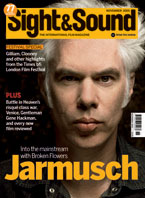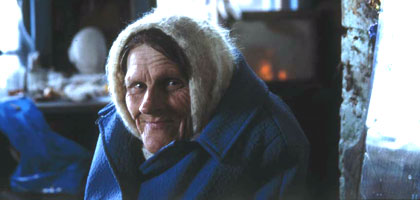Primary navigation

Russia/Netherlands 2004

Reviewed by Ryan Gilbey
Our synopses give away the plot in full, including surprise twists.
Moscow, the present. Three strangers swap stories in a bar. Oleg, a meat salesman, claims to supply water to the Kremlin. Marina, a prostitute, says that she is selling a device that reduces tension in offices. Volodia, a piano tuner, tells of his experience in genetic engineering, and says that there are entire slums populated by the results of human-cloning experiments. Volodia is later arrested by police and interrogated about an unspecified crime.
Oleg returns home to be waited on by his father. Marina learns of the death of her sister Zoya, and travels into the countryside for the funeral. There she is reunited with two identical-twin sisters and discovers that Zoya choked to death while making one of the bread-faced dolls that were the speciality of herself and the elderly women in her community. After the women express concern over how they will continue to manufacture the dolls without Zoya, Marina burns the remaining doll parts on Zoya's grave. Oleg crashes his car after swerving to avoid a dog.
With its emphasis on visual texture and shock tactics, and an eagerness to signal its every influence, 4 is transparently a showreel to launch first-time director Ilya Khrzhanovsky into the marketplace. Even as a calling-card, though, it leaves something to be desired. The eye-catching images that impress in isolation but are rarely contextualised suggest he has set his sights on a career in advertising. On the other hand, his challenging use of long takes indicates a yearning to be taken seriously as an artist. To this end, he stages a stock shot that once signified austerity in arthouse cinema but has since passed into the realms of parody: the painstakingly held long shot of a lone figure trudging across a desolate landscape from one side of the frame to the other. He includes the shot twice. If nothing else, this earns the movie full marks for sincerity.
Within the chaos of 4 there are a few nicely turned shorts waiting to get out. Rural Russia is put to potent use as the camera stalks a woman through a dense forest in a teasingly drawn-out sequence; the director knows from Tarkovsky that the land can be a charismatic performer in its own right. Another successful episode, in which three strangers (a meat salesman, a piano tuner and a prostitute) pitch up in a bar and lie about their professions, works both to the film's advantage and disadvantage. The tension is ratcheted up so delicately, as Khrzhanovsky progresses from wide shots to medium shots to pore-scrutinising close-ups over the course of an uneasy conversation, that it earns the movie credit with the viewer during later taxing or tedious passages. But it is also true that this encounter, during which the dialogue conjures images more disturbing than anything the camera actually shows, overshadows what follows. The director and his screenwriter, novelist Vladimir Sorokin, play this ace too early. All that's left up their sleeve after that are jokers.
From David Lynch, Khrzhanovsky has learned that sound can be as disquieting as image; but, in contrast to Lynch, 4 wears its bizarre details like attention-seeking brooches, rather than allowing them to grow organically from the material. It seemed natural somehow that the hero of Eraserhead would be served a meal of menstruating 'man-made' chickens by his future in-laws; Lynch had established an environment that was so convincing that its most grisly excesses acquired a strange plausibility. Those chickens were at the forefront of Sorokin's mind when he imagined one of 4's character encountering a freezer stocked with 'round piglets'. But the image has no currency. It isn't distinctive like Lynch's conceit, nor does it belong in the rainswept, steel-coloured Moscow streets, where the strangest thing we've seen has been a scrum of department-store mannequins.
Similarly, when the prostitute Marina visits a remote rustic community for the funeral of her sister, she discovers a cottage industry making dolls out of masticated bread. Quite apart from these two scenes making no sense and exhibiting a complete absence of surrealist resonances, they are hamstrung by their echoes of Jan Svankmajer's work, with which they cannot compete. And the rowdy wake at which elderly women (all non-professionals) get drunk and bare their breasts provokes a wistful fondness for the comparatively tender films of Harmony Korine, which might be a first.
This film might have been less shambolic if Khrzhanovsky had decided whether he wanted to preclude or solicit his audience's involvement. He wants us to be baffled by his digressions and non-sequiturs, but also to be persuaded by the intimations of cosmic coherence suggested by the film's thematic links (vodka-drinking, cloning, meat, dogs). He wants to have his round piglet and eat it.